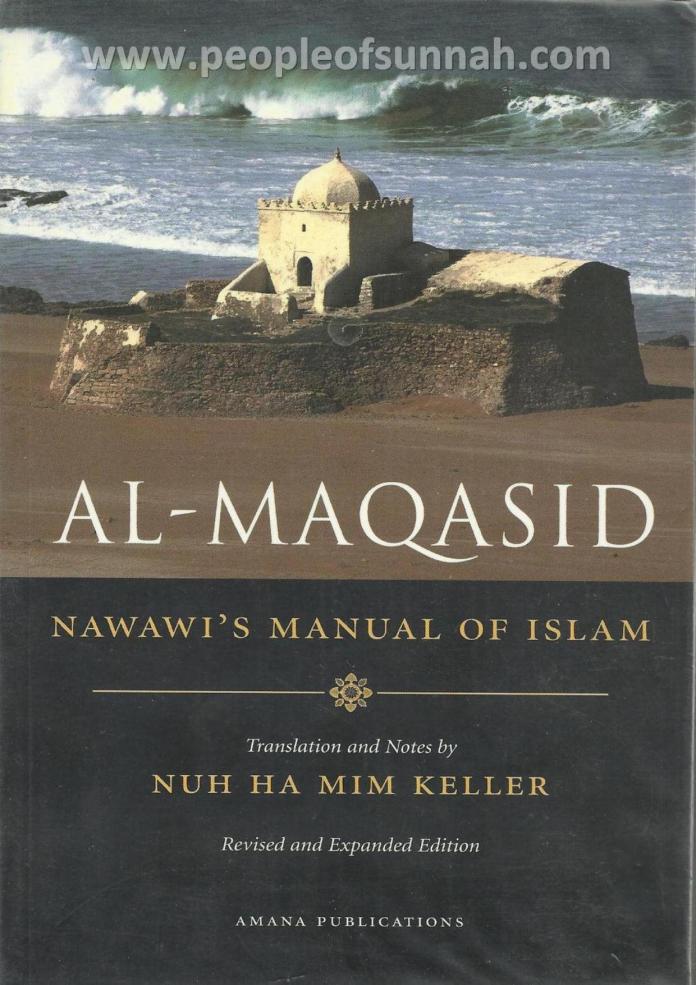Al- Maqasid – Manual of Shafi’i Fiqh
(An excellent primer for people learning the basics of Islamic practice and law – Difference between this and Reliance of traveller is that is simpler for beginners to understand)
In the Name of Allah ,
Most Merciful and Compassionate
INTRODUCTION
Praise to Allah Most High, who shows whomever He wills the path to eternal happiness, the sunna of His beloved prophet (Allah bless him and give him peace), to whom He gave the message for mankind:
“Say: ‘If you love Allah, then follow me; Allah will love you and forgive you your sins. Verily Allah is forgiving and compassionate”’ (Quran 3:31).
To follow the Prophet (Allah bless him and give him peace) was a simple matter for his Companions (Sahaba); they knew and loved him, and when he would tell them something, they said, “We hear and obey.” When he passed from this world, the Qur’anic imperative remained, and the Companions diligently preserved all that they had learned from him, both the Divine Book that Allah had sent with him, and his example, in word and deed. Those who had taken knowledge from him during his lifetime passed it on to those after them, and so on down to our own times — and little wonder, for in their eyes, these were medicines that meant eternal life for whoever possessed them.
The Qur’an, the first source of guidance, was memorized during the lifetime of the Prophet (Allah bless him and give him peace) by thousands of Companions in a deliberate and sustained educational effort centered around the mosque in Medina, whence teachers were sent to tribes in all parts of the Arabian Peninsula. The hadiths , or eyewitness accounts of the Prophet’s words and deeds, were transmitted in precisely the same way, first to contemporaries and then to subsequent generations. Someone who has lived among the Arabs can attest to their phenomenal powers of memory, and it is not difficult to understand why, given their concern, the individually recorded reports from his life came to number over a hundred thousand.
Many of these were from various narrators describing the same events, but allowing for repetitions (which were carefully memorized and transmitted by hadith masters (huffadh)), and discounting spurious (mawdu 1 ) accounts by later narrators (which were equally carefully preserved, so as not to be accepted), the substantive hadiths that reached the Muslims from the Prophet (Allah bless him and give him peace) numbered approximately thirty thousand.
The Muslim community responded to the magnitude of this knowledge and to the ethical imperative of living it on a daily basis with a wide range of scholarly disciplines that furnished the means to distill this vast tradition into a clear, practical answer to the question: What does Allah expect of one?
This then, is the basis of the study of Sacred Law or shari *a in Islam: we have been ordered to follow the Prophet (Allah bless him and give him peace), and he is no longer alive to personally teach us. All that has reached us of it has reached us through men. And this is why Muslims from earliest times have relied on the most knowledgeable of these men to take their religion from — whether in hadith, tenets of faith (‘aqida), Qur’anic exegesis (tafsir), or the other Islamic sciences. The foremost of them were termed Imams or “leaders,” in view of their position in each field, so their knowledge could be accepted and followed.
For orthodox Muslims (Ahl al-Sunna wa al-Jama‘a), there are four Imams of Sacred Law: Abu Hanifa, Malik, Shaft ‘i, and Ahmad. The rulings that they concur upon, about 75 percent of them, are a decisive proof for Sunni Muslims; while those they differ upon have been accepted by the Community for over a thousand years as a mercy from Allah. Whoever examines the differences, moreover, finds that their roots invariably extend back to the prophetic Companions, from whom the Imams took their knowledge in an unbroken series of masters, the Companions in turn having been educated by the Prophet himself (Allah bless him and give him peace) such that it is unimaginable that their differences should be blameworthy.





Islamic qran